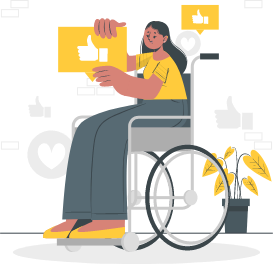
Physical Access and Service Animals
More than 30 years after the passage of the ADA, many buildings still remain physically inaccessible. Even accessible buildings and parking lots can develop uneven surfaces that make access impossible or even dangerous. Service animals are increasingly accepted, but there are still many organizations that have not provided adequate training.
The right to bring a service animal to a place of public accommodation varies by location and context and may be governed by the ADA (Title II or III), the Fair Housing Act, Air Carrier Access Act, and state law. But, in general, service animals cannot be restricted from any place the public goes unless their presence would fundamentally alter the nature of the goods, services, programs, or activities provided to the public. Using a service dog does not permit extended inquiry into the nature of the disability or the purpose of the dog. When it is not obvious what service an animal provides, only limited inquiries are allowed. Staff may ask two questions: (1) is the dog a service animal required because of a disability, and (2) what work or task has the dog been trained to perform. Staff cannot ask about the person’s disability, require medical documentation, require a special identification card or training documentation for the dog, or ask that the dog demonstrate its ability to perform the work or task.
Federal regulations implementing the ADA provide specific standards for physical access. The Department of Justice also provides important technical guidance setting forth specific examples of compliant and non-compliant design. Physical access standards may vary based on the age of the building in question and whether it has been modified. If you have a question about a physical barrier that limits your access, or if you have been injured because of inaccessible design, contact Undaunted Law Firm for a free consultation.On This Page
The Americans with Disabilities Act or ADA and other laws require buildings to be accessible to wheelchair users and people on crutches or using canes or walkers. Stairs, high countertops, lack of accessible restrooms, and lack of parking may be against these laws. These laws also allow people to bring specially trained service animals to places where animals are not usually allowed. People who have difficulty entering or using facilities because of a physical access problem or because they have a service animal can contact Undaunted Law Firm to get assistance.



 Free Consultation
Free Consultation info@undauntedlaw.com
info@undauntedlaw.com 844-ADA-IDEA
844-ADA-IDEA